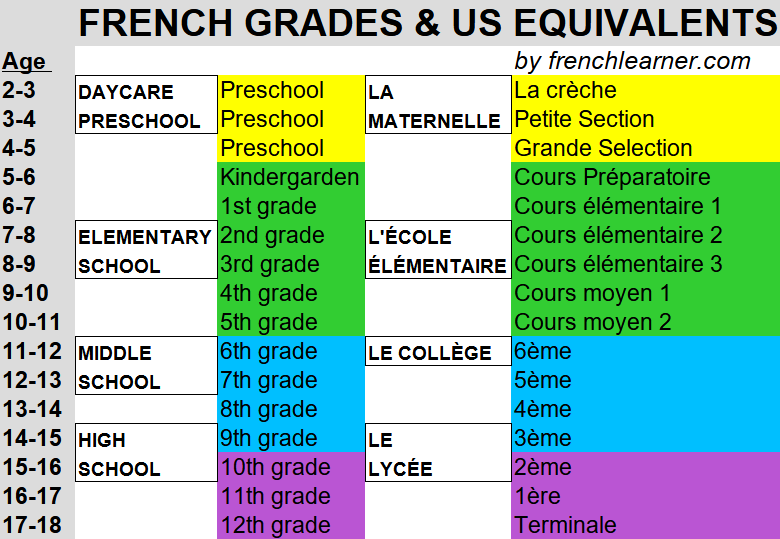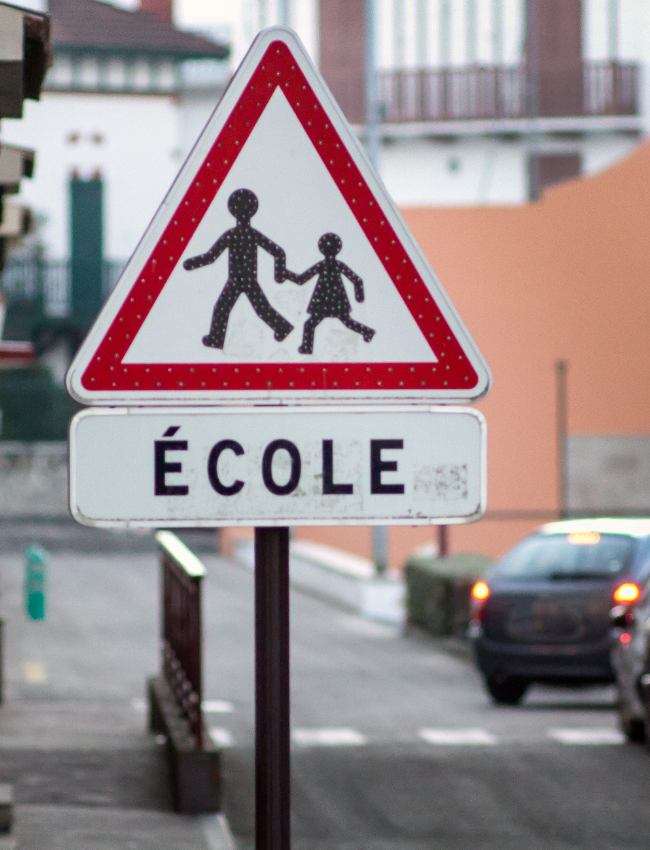French school system, grades and diplomas explained
Are you moving to France and wondering what to expect from the national school system? Or just curious about teaching in a country that birthed Voltaire, Monet, and the language of Molière?
We look at how the French education system works with intriguing comparisons to the US. You might be surprised at the differences and the occasional similarities.

Is the French education system any good?
Let’s start with a question every transatlantic parent will worry about: is the French school system good?
The short answer is yes.
Any country that produced 71 Nobel Prize winners (4th overall, globally) must be doing something right.
But the French school system is far from flawless. The OECD’s Program for International Student Assessment (PISA) places France just 26th of 41 assessed countries in 2023.
However, PISA looks at more than educational skills. For reading, literacy, math, and science, France scores a respectable 494, above the OECD average of 488.
For comparison, the US is ranked 8th globally and scores just one point higher (495) for core skills.

What’s differences will American students notice?
Ask an American in France about the French vs. American school systems, and several differences are regularly mentioned. It’s a mixed bag of stuff that matters and things that are simply surprising. We’ll let you decide which:
- Schooling in France is highly centralized, and curriculums are consistent across départements.
- There are no school board elections. Parents may join a group organizing school activities, like the annual kermesse (summer fete,) but have little influence on teaching.
- French teachers teach – they are rarely involved in after-school activities.
- Schools in France are strict, and the teacher-student relationship can be very formal.
- School days are longer in France but include a full or half day of closure on Wednesdays.
- There are no yellow school buses. Free or subsidized buses are typically provided up to 15 years old.
- There is no dress code for any age.
- French children have unnervingly neat handwriting drilled into them from a young age.
- University education is essentially free in France.

The school system in France
Behind those headline differences, there is some info that every parent should know when moving from the US to France.
Education in France is compulsory from 3 to 16 years old. The law was changed in 2018, reducing the mandatory starting age from 6.
Public schools in France are free and secular. Stationery and other ancillary costs are out-of-pocket costs. Insurance is required for sports and school trips, and a copy of the certificate will be requested.
At primary level, you will find private, typically Catholic, schools. Private schools in France are cheap, around €300 annually. Many are in demand, with a higher teaching reputation.
There are very few private schools at the high school level. Most are expensive international schools located in cities with large expatriate communities, notably Paris.
The choice of public schools is determined by geography, and parents have little say in which schools their children attend. Consequently, private tutoring is widespread.
Between 16-18, educational paths are chosen. The French school system is geared towards graduating with a baccalauréat (aka, le bac). It is broadly equivalent to a High School Diploma.
There are three academic and eight technical baccalauréat, in addition to vocational equivalents.
At 16, it is possible to opt for a course only offered at a preferred lycée. This explains why some teenagers suddenly develop a keen interest in Latin or ancient Greek history.
The four stages of schooling in France
There are four stages of education in the French education system, discounting post-18 education (university or vocational colleges):
École maternelle (preschool and kindergarten) – for children aged 3 to 6. This is typically provided at an école primaire and prepares kids for primary teaching.
École élémentaire (primary school) – The first stage of measured education for children aged 6 to 11. Children follow a teaching curriculum from this point, which includes a second language.
Collège(Middle School and Junior High) – pupils aged 11 to 15 follow a broad program of study.
Lycée (High School) – further secondary education until age 18, although students can leave at 16. The final two years teach narrow baccalauréat subjects.
Grading – France vs. American Education system
Another clear difference between French vs. American school systems is how grades are described.
The first three years of school (3-6) are known as the first cycle, or La Maternelle (kindergarten.) Equivalent to preschool/kindergarten in the US.
At the primary school level, grades are named rather than numbered. The terms loosely describe the level of learning, which starts with CP, or cours préparatoire (preparatory,) stretching to CM 2 (cours moyen) at age 11 (5th grade.)
For college-age upwards (11+,) numbers take over, but in reverse. The US counts up from 6th grade, and the French system counts down from 6ème. The final year (i.e., 12th grade) is terminale (final.)
Universities in France
A world-beating feature of the French education system is that public universities are free for residents and international students.
There are some annual admin fees, typically €170 (Undergraduate) and €243 (Master’s,) but that’s a drop in the ocean compared to university fees back home. Private universities in France are more aligned, averaging €10,000 per annum.
There are 140 universities in France, the EPSCP – Éstablissement public á caractére scientifique, culturel et professionnel (Public Establishments of a Scientific, Cultural or Professional Character).
83 are public institutions, and the remainder is elite Grands éstablissements public, like the illustrious Sorbonne.
Those numbers exclude the famous Grandes Écoles – uber-elite private universities akin to the Ivy League, with specialist teaching. For example, the Institut National Du Service Public (formerly the École Nationale d’Administration) teaches much of France’s political class.

French degrees vs. US degrees
The annual QS rankings place 13 French universities in the top 500 globally. However, this is eclipsed by US universities, with 12 in the world’s top 25 alone.
A French degree still opens doors. And since 2004, they’ve been easier to compare internationally, when France adopted Le système LMD: Licence–Masters–Doctorate. This corresponds to Bachelor’s-Master’s-Doctorate.
In the past, you would have seen the qualifications tied to a baccalauréat. A Licence, for example, was Bac+3 (baccalauréat plus 3 years of further study.)
Now, the system allocates degree level and length of study. An L3 is a 3-year licence, equivalent to a Bachelor’s.
An L2 is equivalent to an associate degree in the US.
Master’s degrees are studied for one or two years: M1 or M2.
PhDs are broadly comparable to doctorates in the US but focused on training for research, incorporating other components in addition to a primary thesis.
France uses the Bologna Process, participating in the European Credit Transfer and Accumulation System (ECTS.) ECTS facilitates transfer and comparison between degrees issued by European universities.
How long is the school day in France?
Search online, and the most common observation is that school hours are longer in France.
A typical school day in France is from 08:30 to 16:30. Excluding breaks, a school week delivers 24 hours of lessons.
The biggest shock for many is that école élémentaires are usually closed on Wednesdays. And collége and lycée are typically closed on Wednesday afternoons. Efforts to remove this parenting inconvenience invariably hit a brick wall with teaching unions.
A local périscolaire (extracurricular) may be the solution for young children. It’s essentially a kid’s club, open when schools are closed. It is a lifeline for working parents with young children and is usually subsidized and inexpensive.
School vacations in France
Vacations are cherished in France. Parents may have generous workplace allowances but must contend with long school vacations totaling 16 weeks over 5 different periods. That’s in addition to jours fériés (public holidays) that fall outside vacations.
There are three teaching zones in France, each with different vacation start and end dates to stop the beaches from getting too crowded.
The school year in France begins on the 1st of September, following the 8-week vacances d’été (summer vacation.) Even for non-parents, La rentrée signifies the end of summer fun. Or perhaps a moment to sigh with relief.
Lunches in French Schools
We round out our guide to the French school system with the obligatory section about food, namely school lunches. The French love of food and dining etiquette begins at school.
Schoolchildren have 1-1.5 hours of lunch. Primary school children often pop home for a nap.
When they’re old enough, most children eat at the school canteen and enjoy hot, varied multi-course meals.
Lunches vary in price and level of local subsidy, usually €3 to €5. Quality is high, including starters, mains, cheese, and desserts. And wine (only kidding.)
Here’s a taster — don’t look if you’re hungry, as it all looks delicious!
There’s no junk food on the menu, except on the occasional Friday. Only those with special diets can bring their own lunch, with prior permission.
Final thoughts
US parents living in France will discover there are many, many subtle differences comparing French vs. American school systems. We’ve only scratched the surface. But hopefully, this guide to the French school system has answered your most burning questions and at least highlighted the major differences.
